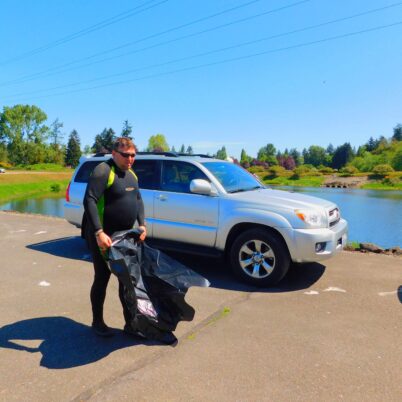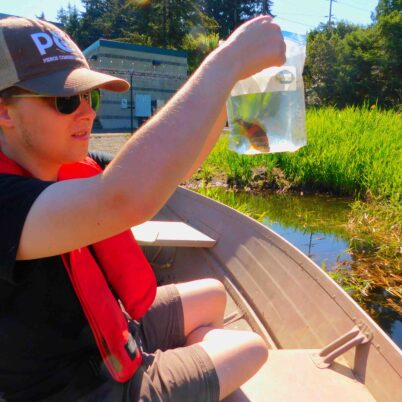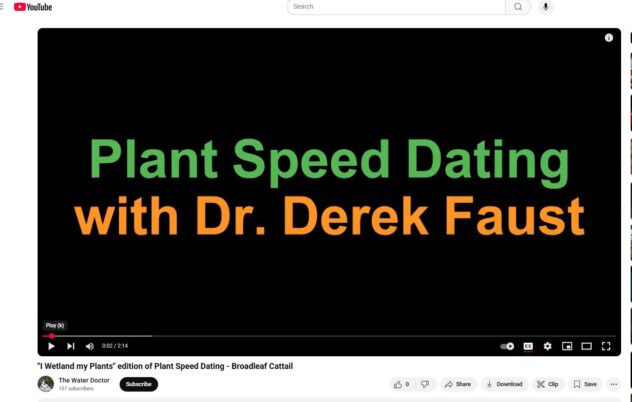Getting to Know: Dr. Derek Faust

The Faces of Faculty: Dr. Derek Faust, Plant Speed Dater
“In essence, environmental scientists should have good job security for a long time.”–Dr. Faust
Q & A with Derek Faust
Seven years ago, Dr. Faust joined Clover Park Technical College in the Environmental Sciences program . In continuing the multiple legacies and learning outcomes established by the late Dr. Andy Fritz, Dr. Faust has worked to expand and place his own perspective in the program. It was his vision to expand the Associate’s Degree for the Environmental Science & Tech Program to a Bachelor’s. From the beginning he has kept an eye to the future of the students and how their training would favorably meet the standards of today’s job market. Despite his full workload, he strives to be as approachable as possible with students and campus needs, as well as be an outspoken, proactive representative for the college in South Puget Sound.
Regarding Expertise in the Subject:
Question: How do you stay up to date with developments and emerging issues in environmental science?
Answer: A lot of reading. I read popular media articles and books related to environmental sciences. There are too many peer-reviewed journal articles to read them all, but I do read ones within my areas of expertise. I also conduct peer reviews for scientific journals. I am also an active member in the Society of Wetland Scientists and Soil Science Society of America. There are also a few organizations on social media that post great information in a very entertaining way. Seriously, check out the social media pages of the National Park Service, U.S. Fish and Wildlife Service, among others.
Question: What are the most pressing environmental challenges today, and how do you address them in your curriculum?
Answer: Honestly, that is a very subjective question and depends on who you ask. Most would say that climate change is the environmental challenge elephant in the room, and I would agree. I also think that other biogeochemical (i.e., nutrient) cycles (e.g., nitrogen and phosphorus cycles) deserve attention as well, but perhaps that is because I’m biased as it’s my area of expertise. There is also a good argument for contaminants of emerging concern such as PFAS (“forever chemicals”), plastics/microplastics, etc. In essence, environmental scientists should have good job security for a long time.

Question: Describe a hands-on or field-based activity you’ve used to engage students in real-world environmental issues.
Answer: Since we are a technical college, we do a lot of hand-on and field-based activities, especially since we have the 115-acre Flett Outdoor Lab directly across the street from campus. One example is students engaging in habitat restoration efforts on our outdoor lab. They learn how to remove various invasive plant species, make an action plan for continuing restoration in our Flett Wetland riparian site, and learn to safely use a brushcutter and other tools.
Question: In what ways have you contributed to sustainability initiatives on campus or in the community? As Dr. Faust was responding to these questions, he was preparing to go to Tacoma Nature Center for a community meet and greet.
Answer: I host almost monthly habitat stewardship events on CPTC’s Flett Outdoor Lab, to remove invasive plant species, followed by planting or seeding native species. These events also help build community around ecosystems important in this region such as Garry oaks and wetlands. I am also vice-chair of the Chambers-Clover Creek Watershed Council and a board member of the Nisqually Reach Nature Center. As a private citizen, I occasionally make public comments at city and county council meetings on issues related to environmental challenges.
Question: How would you collaborate with colleagues from other disciplines to enrich Environmental Science education?
Answer: I have collaborated on a couple projects with the faculty and students in the Construction Technologies program. The major project was the design and construction of a greenhouse by students in the Construction program. Environmental sciences students are using the greenhouse to propagate native plants. We also worked with the Palmer’s Scholars Green Stormwater Infrastructure pathway to rebuilt the piping from the rain gutters on the Zero Energy House to three 1000-gallon water tanks so that rainwater can be used to water the native plants in our greenhouse. I think there are other disciplines (e.g., manufacturing, mechatronics, welding, automotive, chemistry) in which a collaboration could form, but it takes time for ideas to blossom and bear fruit.
Behavioral & Situational
Question: How do you handle differing viewpoints on controversial environmental issues in the classroom?
Answer: It is important for students (and all of us really) to listen to and try to understand the viewpoints of others. Doing so does not mean that we will come to agree with an opposing viewpoint or that it is scientifically supported. However, being ignorant or dismissive or others viewpoints is rarely helpful either. We cannot begin

to address a controversial or challenging environmental issue if we do not understand the issue itself AND the viewpoints of the various people impacted or involved.
Question: If a student challenged the validity of climate change science, how would you respond?
Answer: Similar to my answer to the question immediately above, it is important to listen to and try to understand the viewpoint(s) of the student challenging the validity of climate change science. It will allow for a tailored response to their views and may allow for an actual conversation. In addition, if students (and others) are able to politely engage with someone on the science of climate change (or some other environmental issue) and offer effective rebuttals, then they have demonstrated they have a firm understanding of the issue.
The Plant Speed Dating Emcee: Dr. Derek Faust
Besides being active on multiple social media channels like LinkedIn, Dr. Faust has his own YouTube Channel, where he is known as The Water Doctor. One of his ongoing passion projects for science is to introduce the public to the flora the same plants in his curriculum.